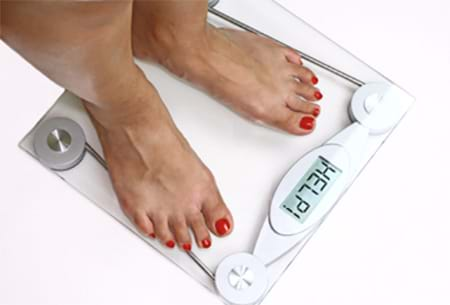Authored by Dr. Sarika Arora, MD
If you’ve been trying to lose weight, you can probably see why fad or crash diets and endless exercise sessions don’t work. To lose weight, your system wants balance, not extremes. When you can achieve healthy balance all around, your weight will often take care of itself.

When your body feels comfortable and healthy, losing excess weight becomes a natural and pleasant side effect. But how do you get your body to that place — especially if you’re struggling with barriers like weight loss resistance or a systemic block that’s preventing you from losing weight?
We know the best ways to stoke the natural weight loss process and we can show you how.
Six steps to natural weight loss:
1. Resist the urge to compare your body to others. Being model-thin isn’t realistic — or healthy — for most of us. So put down the magazines that make you feel bad about yourself and show your body some love by making healthy lifestyle choices. Think about when you looked and felt your best. What was your clothing size then? What habits were making you look and feel your best? Forget about what others are doing and concentrate on yourself — that’s the first step toward meeting your weight loss goals.
2. Celebrate cooking (and eating) at home. Michael Pollan, bestselling author of The Omnivore’s Dilemma and Cooked, urges us to: “Eat food (real food). Not too much. Mostly plants.” Following these three rules means cooking more in your own kitchen. We know this takes time — but it’s worth it. Make eating eventful by creating great meals and sharing the experience with people you love. It will have exponential effects on your weight — and your health.
3. Make movement fun. You can dance, walk the dog through the woods, play a sport, practice yoga, swim — anything that gets you moving and makes you feel good is a formula for long-term weight loss. Exercise shouldn’t be something you do just to burn calories. Choosing an activity you enjoy makes sure you’ll do it consistently.
4. Stick to a consistent sleep schedule. Research shows that not getting enough sleep can alter your appetite and insulin control by increasing the hunger hormone, ghrelin, and decreasing leptin, the hormone that makes you feel full and satisfied. Leptin is a key weight loss hormone because it can raise resting metabolism and ramp up fat breakdown — both essential for shedding extra weight. Since our bodies thrive on having a predictable daily rhythm, set a regular bed time and stick to it. Sleep 7-8 hours every night, and try to get up at the same time most days. If stress and excess cortisol are keeping you awake, look for added support through a sleep and stress hormone support formula like Serinisol.
5. Supplement to power your metabolism. Add in research-based supplements to your regimen of nutrient-dense whole foods and consistent exercise. Green tea has been shown to stimulate calorie-burning and decrease body fat. Chromium helps balance glucose (sugar) and insulin activity. L-carnitine l-tartrate helps convert fat to energy. Two recent discoveries are fat-burning herbs: Indian spaeranthus and mangosteen. All these ingredients are in our product M-Boost.
Note: a systemic imbalance may be blocking your weight loss. The most common include hormonal, thyroid and adrenal imbalances. If one or more of these areas is out of whack, it’s next to impossible to lose weight until it’s corrected, and only you can do that. To drop stubborn weight, try one of our Weight Loss Resistance Protocols with herbal products and lifestyle secrets that target these three main areas.

6. Embrace moderation. We like to follow the “80-20 rule.” Eat and live as healthfully as you can 80% of the time and let go 20% of the time to indulge. You may find that it feels so good to be healthy you don’t crave treats as often. For holidays and parties, make a plan ahead of time and stick to it. Schedule one day of indulgence (or even just one meal) and get back to a lifestyle that supports your body the next morning.
When it’s natural weight loss, it lasts… and lasts
The best part about natural weight loss? The results last. So many women tell us they’ve successfully adapted this new eating style to their lives and they can’t imagine living without it. You can start feeling better about your weight by taking our quick Weight Loss Quiz and take a look through our SHOP to find the natural weight loss support you need.
Taking better care of your body and health will show in your appearance, and on the scale.
References and further reading
[No author listed.] 2004. Frontline: Diet wars: View online | PBS. URL: https://www.pbs.org/wgbh/pages/frontline/shows/diet/view/ (accessed 04.03.2009).
Fritsch, J. 1999. 95% regain lost weight. Or do they? URL: https://partners.nytimes.com/library/national/science/052599hth-weight-myth.html (accessed 04.03.2009).
Hendrick, B. 2010. Percentage of overweight, obese Americans swells. WebMD. URL: https://www.webmd.com/diet/news/20100210/percentage-of-overweight-obese-americans-swells (accessed 12.17.2010).
Further reading
Pick, M. 2010. The Core Balance Diet. Carlsbad, CA: Hay House.
Illingworth, J. 2009. University of Leeds School of Medicine. MG ChB Year 1: Nutrition and Energy. Lecture 26: Regulation of body weight. URL: https://www.bmb.leeds.ac.uk/teaching/icu3/lecture/26/ (accessed 04.03.2009).
Centers for Disease Control/National Center for Health Statistics. 2006. Prevalence of overweight and obesity among adults: United States, 2003–2004. URL: https://www.cdc.gov/nchs/products/pubs/pubd/hestats/overweight/overwght_adult_03.htm (accessed 04.03.2009).
Hellmich, N. 2005. Percentage of overweight Americans stable. URL: https://www.usatoday.com/news/health/2005-10-03-weight-trends_x.htm (accessed 04.03.2009).
Von Duvillard, S., et al. 2004. Fluids and hydration in prolonged endurance performance. Nutrition, 20 (7–8), 651–656. URL (abstract): https://www.ncbi.nlm.nih.gov/pubmed/15212747 (accessed 04.03.2009).
Korner, J., & Leibel, R. 2003. To eat or not to eat — how the gut talks to the brain. NEJM, 349 (10), 926–928. URL: https://content.nejm.org/cgi/content/full/349/10/926 (accessed 04.03.2009).
US FDA. The facts about weight loss products and programs. FDA/FTC/NAAG Brochure: 1992. URL: https://www.cfsan.fda.gov/~dms/wgtloss.html (accessed 04.03.2009).











